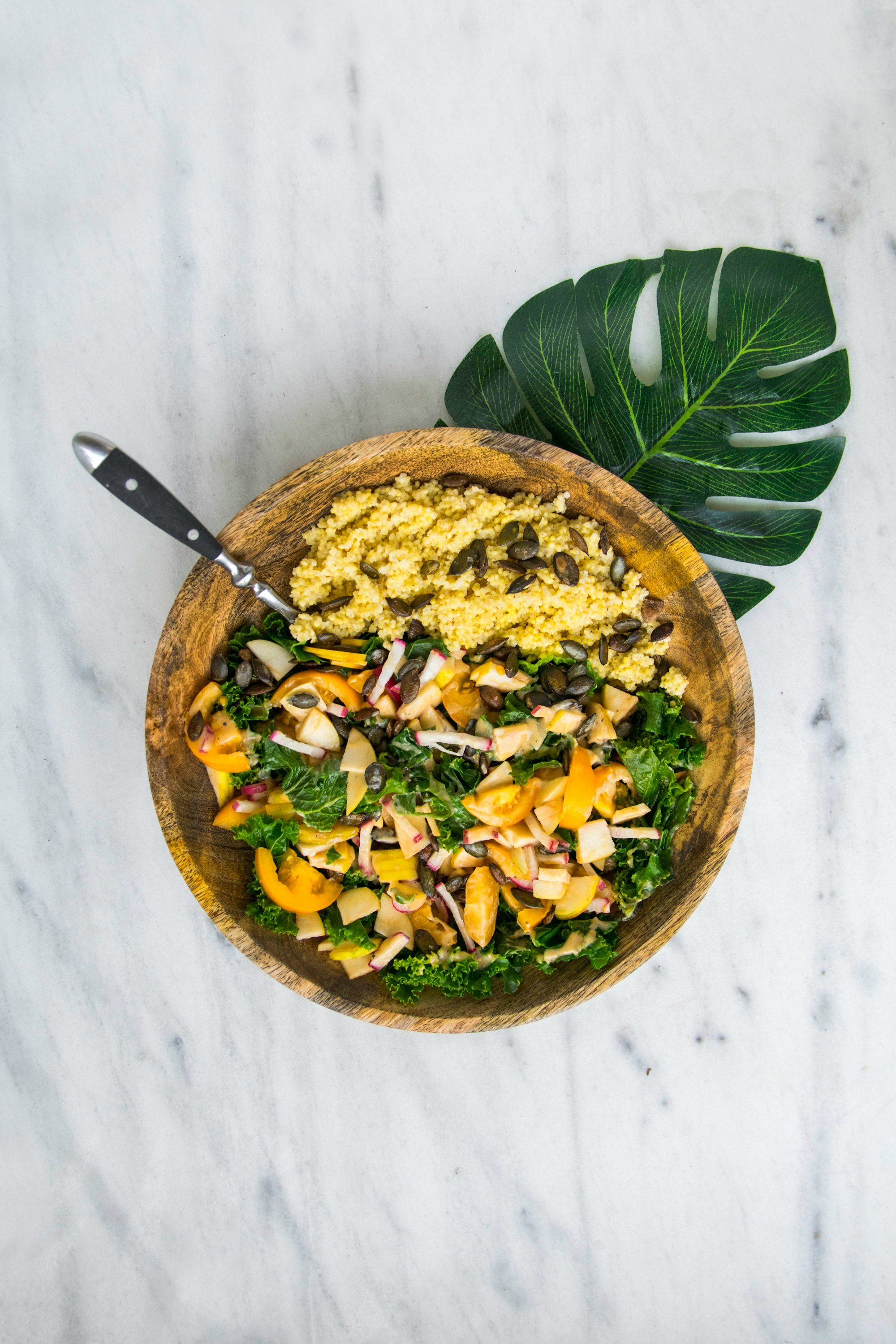Nutritional Science: Plant-Based Diet
Let’s be honest, when you hear “plant-based” you instantly think of a giant bowl of salad, “that” section of the grocery store, and minimal protein. While not completely wrong, there is much more to a plant-based diet than these surface-level thoughts.

Let’s be honest, when you hear “plant-based” you instantly think of a giant bowl of salad, “that” section of the grocery store, and minimal protein. While not completely wrong, there is much more to a plant-based diet than these surface-level thoughts. So, let’s dig deeper into what this term truly encompasses. Before you read on, please note that this is not medical advice.
What is a plant-based diet? This type of diet or eating pattern focuses on foods primarily from plants. Many registered dieticians disclaim that this eating pattern means you are strictly vegetarian or vegan and never consume meat or dairy. Rather, it means that you are proportionately choosing more of your foods from plant sources. I practiced a vegetarian lifestyle for my last two years of pharmacy school. This is when I found a love for the endurance sport triathlon and wanted to fuel my body better with easy-to-digest nutrients and fiber. Animal protein can be difficult to digest and can reside in the intestines for a significant period of time. Additionally, for endurance athletes and others, dairy can cause inflammation in the gastrointestinal tract inducing pain and discomfort.

Personally, there were many appealing aspects of a plant-based diet that I thought would help elevate my training. But, endurance athlete or not, why should you practice a plant-based diet?
First, there is ample literature to support plant-based diets. Much of the literature focuses on the relationship between diet and disease states such as heart failure, hypercholesterolemia, depression, cancer, diabetes, and more. Plant-based eating has been shown to decrease progression and resolve many of these chronic disease states. A common phrase associated with this concept is the “Brain-gut-microbiome axis.” This is a topic for a different day, but an interesting and growing field of medicine, nonetheless. If you're unfamiliar, here are a few podcasts that I personally enjoyed that can introduce you to the topic (Medspiration, BPN Podcast).
Second, there are numerous health benefits associated with plant-based eating patterns. Plants are full of vitamins and minerals including potassium, magnesium, folate, and vitamins A, C, and E. Plants also contain fiber. Fiber is a type of carbohydrate that cannot be completely broken down by human digestive enzymes. It helps maintain regular gastrointestinal motility (relieves constipation), decreases the risk of colorectal cancer, lowers cholesterol, helps control blood sugar, and can assist in achieving a healthy body weight. The recommended daily fiber intake for adults less than 50 years old is 38 grams for men and 25 grams for women. Additionally, plants are full of phytochemicals and antioxidants which can help boost your immune system. Antioxidants can aid in reducing inflammation by neutralizing free radicals that are naturally produced in the body from pollution, processed foods, bacteria, and viruses.
Third, the world can run out of meat! Commercialized animal products require more energy to produce than several other types of foods. The eating habits of the world today, mainly Western eating habits, are draining the planet of resources and food for the growing population. Multiple expert reviews support a push towards more plant-based diets as this is where the planet is heading over the next few decades. You can grow your own plants at home with minimal maintenance whereas raising animals for human consumption requires feed and results in a larger carbon footprint, pollution, and water consumption. Many statistics show that a purely animal-based diet would require significantly more crop growth in comparison to a purely plant-based diet.

The pitfalls of a plant-based diet are mainly health concerns. Yes, health concerns. We just discussed all the health benefits from this type of eating pattern, but no “diet” is without flaws. As mentioned in the Nutritional Science: Carnivore Diet article, animal products are loaded with their own types of vitamins and minerals. What plants lack that animals contain are essential amino acids (protein) and vital minerals for the body such as iron, calcium, vitamin D, vitamin B12, and fatty acids. As someone who has low iron levels and has taken multivitamins and b-complex supplements throughout childhood because “my mother told me to,” boy did I not know what I was getting myself into when I started my plant-based journey. I wish I knew then what I know now! In my college years, prior to my plant-based endeavor, I actually stopped taking my vitamin supplements consistently. This led to routine rejections at the American Red Cross blood donation centers due to low-iron, and even a Z-score of -1.1 in a pharmacy skills lab, indicating I was at risk for osteopenia and bone fractures! I thought my diet was balanced at the time and it was unintentionally mostly plant-based.
Upon researching plant-based diets, I learned that if I was going to maintain my new eating patterns, I was going to have to either seek out specific plant products that contain the vitamins and minerals I was lacking or start taking my supplements again. Once I normalized my iron and vitamin stores, I saw my energy return and was able to donate blood again!
So how do you get started? I mean, going fully plant-based can sound like a huge challenge. I started my journey as a one-week challenge to myself. After the first week (and yes, this is when I was taking my vitamin/mineral supplements regularly again), I found that I loved the boost of energy, the clean eating, and the excitement of trying new foods. I saw my training excel and my running splits improve. Also, most restaurants have more vegetarian options available now. I will caution that there is a healthy way to move to a plant-based diet and an unhealthy way (uh, did you know Oreos are vegan?). If moving towards a plant-based diet sounds attractive, I would highly encourage you to give it a one-week trial. I would recommend adding in an iron, b-complex, and omega-3 supplement. I would also educate yourself on what plant-based foods are highest in protein to help supplement your intake (see here and here for some helpful articles). I would also consider a calcium-vitamin D supplement, especially if you're female. If a fully plant-based diet is not manageable for your lifestyle, try moving towards a pescatarian diet first. This type of eating pattern focuses on only consuming seafood and plant products, which is a great way to maintain protein and fatty acid intake while moving away from fatty meats such as beef and pork (sorry, brisket and bacon).
DISCLAIMER: This is a big topic and this post is not comprehensive. Please follow the advice of your doctor when it comes to your health.

